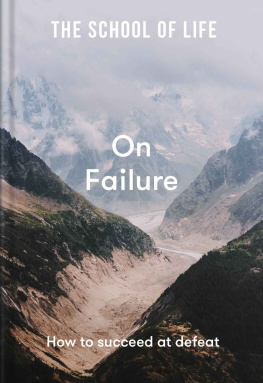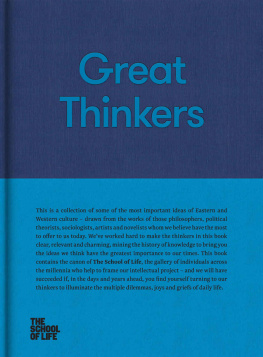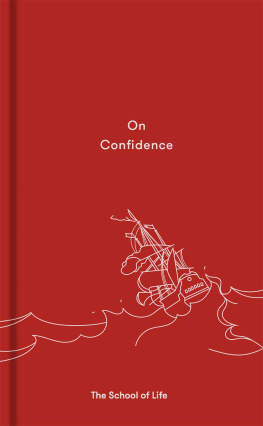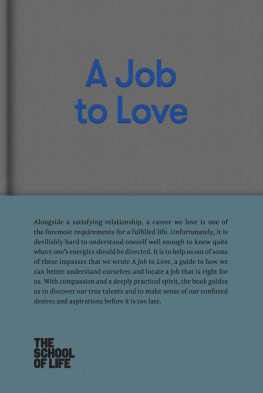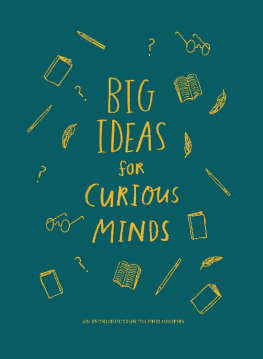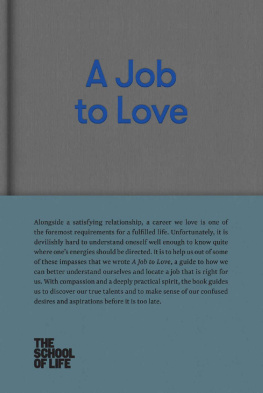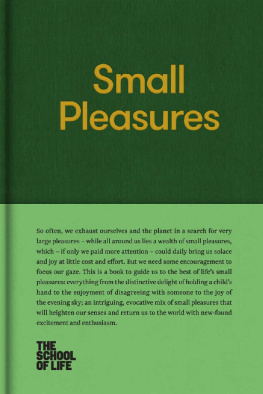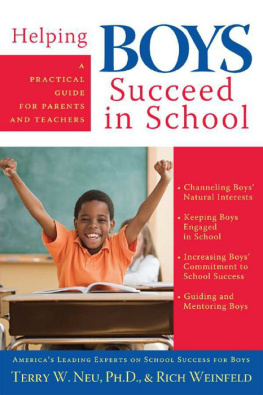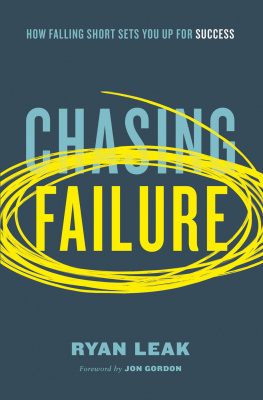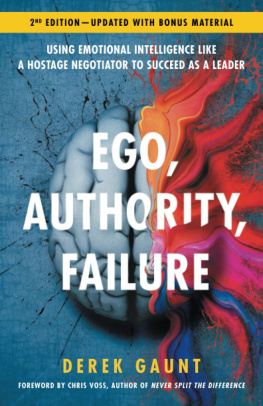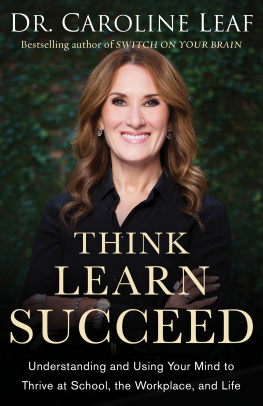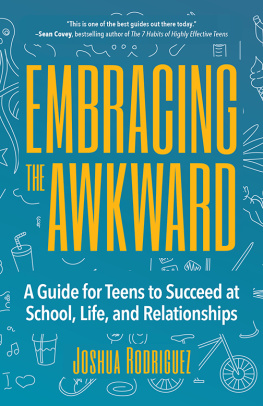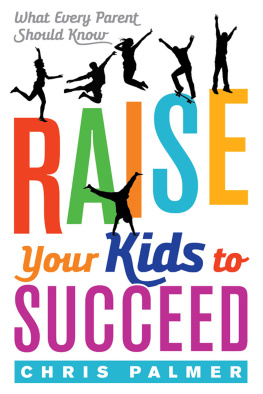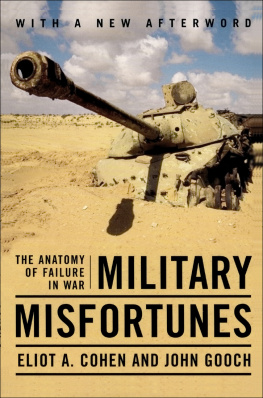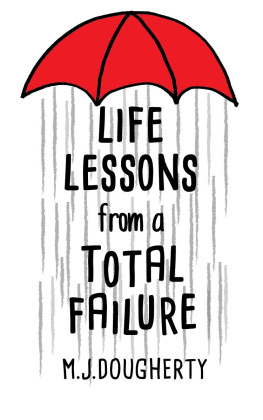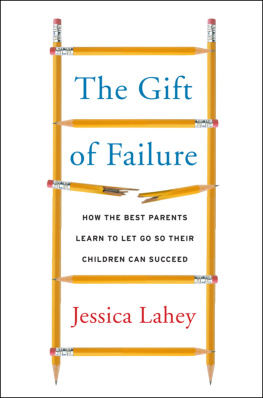The School of Life - On Failure: How to succeed at defeat
Here you can read online The School of Life - On Failure: How to succeed at defeat full text of the book (entire story) in english for free. Download pdf and epub, get meaning, cover and reviews about this ebook. year: 2022, publisher: The School of Life Press, genre: Home and family. Description of the work, (preface) as well as reviews are available. Best literature library LitArk.com created for fans of good reading and offers a wide selection of genres:
Romance novel
Science fiction
Adventure
Detective
Science
History
Home and family
Prose
Art
Politics
Computer
Non-fiction
Religion
Business
Children
Humor
Choose a favorite category and find really read worthwhile books. Enjoy immersion in the world of imagination, feel the emotions of the characters or learn something new for yourself, make an fascinating discovery.
- Book:On Failure: How to succeed at defeat
- Author:
- Publisher:The School of Life Press
- Genre:
- Year:2022
- Rating:4 / 5
- Favourites:Add to favourites
- Your mark:
- 80
- 1
- 2
- 3
- 4
- 5
On Failure: How to succeed at defeat: summary, description and annotation
We offer to read an annotation, description, summary or preface (depends on what the author of the book "On Failure: How to succeed at defeat" wrote himself). If you haven't found the necessary information about the book — write in the comments, we will try to find it.
On Failure: How to succeed at defeat — read online for free the complete book (whole text) full work
Below is the text of the book, divided by pages. System saving the place of the last page read, allows you to conveniently read the book "On Failure: How to succeed at defeat" online for free, without having to search again every time where you left off. Put a bookmark, and you can go to the page where you finished reading at any time.
Font size:
Interval:
Bookmark:
This is a book about failing: messing up, disappointing others, letting ourselves down and ruining our lives. Its a book that is intended to be read at desperate moments: when we cant stop crying, when all our hopes have been dashed and when we are too ashamed of ourselves to reach out for help.
First and foremost, this book hopes to act as a friend; one who accompanies us in the darkest hours and proffers one or two helpful remarks that momentarily cheer us up or at the very least, stop us from feeling so alone. Well meander from this topic to that and explore failure from many angles, but essentially well simply be repeating I know, I know in a tone of wholehearted sympathy and boundless compassion.
It matters that the authors of this volume have themselves known huge failure (abandonment, infamy, panic, chaos). This is far from a dry, academic exercise or psychological treatise. Its a letter written by one set of desperate humans to another. It has its origins in despair and in a slow recovery from catastrophe. Well leave the dispassionate textbooks to others.
Given how much suffering and tragedy there is at large, its striking how few books seem to have been written to comfort us in our hell. An aura of artistic detachment still surrounds so many of the ones that do exist, as if entertainment and enlightenment were the only priorities and disaster chiefly happens to other people. The books may be about divorce, unemployment, disgrace, death, exile, ridicule, opprobrium and mental collapse, they may make us sigh and weep, but it is somehow assumed that the reader will not themselves go through something resembling what has been described on the page. They will watch the central character be jeered and spat at, the heroine flee the country, the hero exchange their family home for a hut and then check the front door is locked, slip into a warm, clean bed and turn out the light in anticipation of a calm tomorrow.
Of course, the closer we get to true, lived tragedy, the harder it is for words to have any useful impact. What can be said to a person who has just lost their livelihood, who has witnessed a loved one die, who is contemplating professional ruin or who will never be able to set foot in their home town again? The challenge is so large, the psyche so ruined, that they might simply prefer silence, which could honour the disaster better than vain arguments.
But there must be a way in which words can be put to use, even now. There is plenty of time to read during crises: many empty hours in the middle of the night on a cancer ward, in an empty marital bed, in a prison cell before the trial or in a little house after a scandal. This book aspires to be read in lonely hotel rooms and on the platforms of deserted railway stations. Its intended audience are those who bewail their fate, who wish they had never been born, who are going out of their minds with worry and who can barely remember a day when they were last not in agony.
Sometimes, at such moments, we might fall upon the Bible. Copies are often left in the bedside tables of hotels. There is certainly comfort within them; from the ancient cadences, the references to distant tribes, the characters who begat X and Y ... The New Testament can be especially tender; it is after all one of the great tragedies of world history and filled with love and hope. The man from Nazareth certainly understood suffering. And yet, for so many of us, the book ultimately doesnt work, because we cannot believe in the beatific solutions being proffered. We are in biblical agony, yet godless. We are Job without even someone to question.
The modern world has not served us well. We have been so busy inventing gadgets to save us time and ease minor frictions, and we are so keen on anticipating a more perfect technological future, that weve overlooked the fact that life continues to provide us all with an endless array of tragic plots, which we cannot even appeal to divine forces to assist us with. This is where this book attempts to fit in. It wants to be the resource that we turn to when everything is as bad as it has ever been.
Well look at two kinds of engagement with failure over the following pages, in their own ways equally harrowing: what we might call actual failure and imagined failure. By actual failure, we mean every scenario in which a life is destroyed by our own errors and the swerves of fate: bankruptcy, social ruin, romantic disaster, disgrace These are explorations and considerations for those who have been severed from loved ones, those who have been arrested or are waiting to be so, those who are in prison, those who have lost all their money, those who will from now on always be pariahs and will never be able to step into polite society again. Well then look at imagined failure, for those who are ostensibly untouched but are in agony within, for their hell is in their minds. They are in a prison of their own psychological construction, terrified of failure not just slightly worried, but unable to sleep, haunted by an apprehension of disaster, mesmerised by spectres of ruin and mockery and brought to the edge of suicide by panic about disgrace and shame.
In both cases, the aim is to find our way towards ideas that will make it possible to go on. We wont deliver happiness, as such, but we are interested in endurance in managing to point the way to an existence where, despite everything, we can keep going, and where there are even occasional small pleasures. A life in which we will be able to smile again, where there might be a little love and laughter even if, right now, what beckons is seemingly lifelong lamentation.
It is worth pointing out that this is also, along the way, a book about resilience, because if we can survive failure if we can find a way through the obstacle course we will never need to be afraid of very much again. True freedom comes from the knowledge that we can get through the worst that life throws at us. We can fail profoundly and still find things, in a way, bearable.
Oscar Wilde, one of the most famous failures of all time, has much to teach us about ruin. At the beginning of Wildes sentence for gross indecency in 1895, when he was in Wandsworth Prison, he was desperate for reading matter. He managed to have smuggled in for him a Bible, some Plato, Dantes Divine Comedy, St Augustines Confessions and works by Walter Pater and Cardinal Newman. Its an intriguing list, and begs the question of what might help someone in prison who is contemplating the destruction of everything they know, who has lost the right to see their children, who has been spat at on the platform at Clapham Common station and who has received hundreds of letters from the public declaring them the most awful person who ever lived. That is an interesting challenge for any book; it sets the bar at an admirable height.
Were taught so much about how to succeed. All the energy and inventiveness of our time is focused there. No one wishes to speak about the less likely, but far more important, possibility that we will witness the destruction of our careful plans. We need a lot of help with failure; we cant allow it to have its victory over us without trying to fight it off with the most vigorous ideas. Were often taught to be suspicious of self-help, and its true that it has its vainglorious aspects when applied to the questions of how to flatten ones stomach or make a fortune. But self-help fulfils its true promise when we are being helped to find a way out of despair.
One of the many cruel aspects of failure is that when it strikes, it can feel like the most unusual and particular event. Why did it happen to me? we wonder, Why have I been singled out? Our failure looks to us like a monstrous exception in an area of life dominated by success a quite spectacularly strange and rare affliction. Weve not only failed, we are it appears almost completely alone in having done so. Everyone elses marriage is stable, even terrific; all around us, there are lovers going out on dates and wedding anniversaries being celebrated. Most peoples jobs are continuing without trouble; its hardly normal to be at a loose end at what should be the height of our career. Theres no evidence that the others around us have lost command of their reason. The name of no one else we went to school with produces search results that render ordinary social life impossible. How have other people managed not to mess up as badly as we have? We might be indoors, crying and hitting the walls or biting our hands, but outside, children are going to playgrounds, birds are singing, suited figures are attending purposeful meetings, families are laughing, youngsters are planning fifty years of success, shopkeepers are wishing their customers a good day and there will be parties to attend at the weekend. We feel like freakish, pitiable outcasts in a world of triumph, friendship, ease and contentment.
Font size:
Interval:
Bookmark:
Similar books «On Failure: How to succeed at defeat»
Look at similar books to On Failure: How to succeed at defeat. We have selected literature similar in name and meaning in the hope of providing readers with more options to find new, interesting, not yet read works.
Discussion, reviews of the book On Failure: How to succeed at defeat and just readers' own opinions. Leave your comments, write what you think about the work, its meaning or the main characters. Specify what exactly you liked and what you didn't like, and why you think so.

